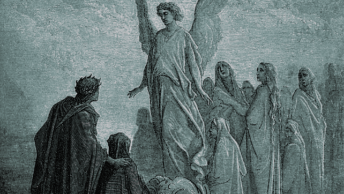I wish I could take credit for this very clever title but it is the title of a book by Jesuit Father James Martin. Father Martin’s book is adept at ferreting a rich lode of precious gems of humor that illustrate the magical link between Catholic sanctity and joy. Devout Catholics and other religious people I know continue to amaze me for their apparent lack of true external joy. One would think that people this close to God would shine like a flaming star.
Another trait that amazes me is that so many holy people, on the doorstep of eternity, express a clever wit that belies the perilous nature of their circumstances. If anyone has ever been to the Sistine Chapel, and I have been–twice, they could not have missed the artistic rendition of St. Lawrence who when being roasted alive on a barbecue grill-like contraption, asked his executioners to rotate him because I’m done on this side. He truly knew how to leave his tormentors laughing.
Then there was my favorite saint and oddly enough the patron saint of lawyers and politicians, St. Thomas More’s classic reproach to his friend, Richard Rich who betrayed him for a political appointment. Why Richard, it profits a man nothing to give his soul for the whole world… but for Wales…!
Before his death More, advised his family to Be merry in God. Without God — without the hope of another world beyond this one, for which this one is longing — there could be no true merriment. There could be only the shallow giggle of flippancy, or the hollow mockery of the cynic. To be truly merry is to live lightly in this serious vale of tears, to be unburdened with cares about things that are quickly passing away. As Bishop Sheen would have suggested we should learn to live in the moment to our fullest ability and in doing so reflect the absolute joy of our resting in the palm of God’s sizable hand.
Thomas More spent his final living moments in the Tower of London. As he lay his head face down on the chopping block, he asked his executioner to be careful with his first strike because of his short neck. St. Thomas had the true Christian spirit of rejoicing in the love of God even unto his last earthly moment.
For those who take God’s will seriously, everything else is just loose change. To be in the world but not of the world is much easier when as Father Martin suggests, we learn to laugh just not at ourselves but the foibles of the world around us. Father Martin believes humor is a necessary prerequisite for sanctity.
Many Catholic saints took the long view of things and were quick to laugh at life’s absurdities and their own personal shortcomings because they had always put their trust in God’s love for them. At a Mass for All Saints Day years ago I was reminded of our ultimate destination. That Feast is special to Catholics because it honors those who have achieved the ultimate destination for each one of us…not just Catholics.
We have a long time friend, who is now the pastor of a neighboring parish we sometimes attend. One evening we went specifically to hear his clear and well-organized sermon but were treated, instead with one of the first public reflections of his Permanent Deacon. Our disappointment quickly vanished as he started to talk about being a member of the Church Militant in hope of becoming a member of the Church Triumphant.
However while life is indeed a serious battle, it should not be without its mirth and good humor. Every time we dine with the aforementioned Monsignor, laughter rings louder than an orchestra of Biblical clarion calls. My wife is especially fond of him because he appears to be a very happy man who is very good at being God’s servant. He smiled when she said that and told us that yes, I am happy…but I do have my problems…like every one… My wife stoically said, well that’s just life on planet earth. Of course even happy priests have problems in the here and now. Well his laugh bellowed out the door when she said that. He promised to quote her in a sermon some time.
We then started talking about how we were at a Mass at St. Patrick’s Cathedral in 1986 when Cardinal O’Connor introduced the congregation to a very special guest–Mother Teresa herself. My wife had spied this little blue and white nun kneeling to the side of the altar as we came into the Cathedral and guessed that it was the famous missionary to India.
I argued that it couldn’t be. It was. She talked for over 15 minutes, lamenting what abortion has done to women. Oh my, oh my…what has become of the world when mothers kill their own babies! These words have lived in our ears and souls ever since. Monsignor said that we were in the presence of a living saint. At last that prediction is coming to fruition!
While Mother Teresa had lit up St. Patrick’s with her personal aura, according to Father Martin’s book, she had a dry but quick wit, which rode sidesaddle to her devoutly serious side. He recounted how one of her sisters came to her and pleaded with her to tell her how she could become a saint. Mother Teresa was quoted as having said: well it would be a good time to die right now because the pope is making everyone a saint.
Mother Teresa was tweaking Pope John Paul II’s penchant for canonizing nearly 500 people during his long-lived papacy. Monsignor wondered if she really had said that. I believe she did because mirth paves the road to heaven. My friend Bobby, whom I have known for 66 years, is a devout Catholic who is an expert on saints. I’ll bet he would agree with Father Martin.








